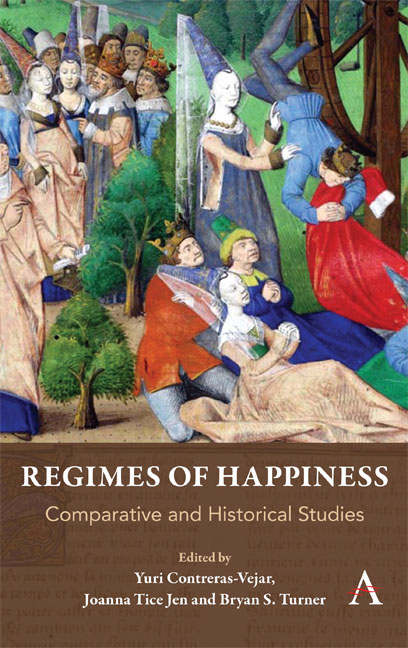Book contents
- Frontmatter
- Contents
- Acknowledgements
- Notes on Contributors
- Introduction: Reflections on Regimes of Happiness
- Part I Happiness in the West
- Chapter One A Fragment of Bliss: Augustinian Beatitudo and the Ideal of Atonement
- Chapter Two Arts of Happiness and Love: Translating Aristotle in the Later Middle Ages
- Chapter Three Spiritual Transcendence as the Path to Happiness in a Selection of Old French Texts
- Chapter Four On Machiavelli, St. Francis and the Pursuit of Happiness
- Chapter Five Their Idea of Happiness Prevents Easy Categorization of Scottish Enlightenment Philosophers
- Chapter Six A Path to Eternal Happiness: Convent Life in the United States in the Nineteenth Century
- Chapter Seven “Be Joyful Always!”: Twenty-First-Century Evangelical Conceptions of Happiness and Trumpist Politics
- Chapter Eight The Erasmus Program: The Promise of European Happiness
- Chapter Nine Innovations in the Psychological Study of Happiness: From Mirror Neurons to Mobile Technology
- Part II Comparative Perspectives
- Index
Chapter Three - Spiritual Transcendence as the Path to Happiness in a Selection of Old French Texts
from Part I - Happiness in the West
Published online by Cambridge University Press: 29 May 2019
- Frontmatter
- Contents
- Acknowledgements
- Notes on Contributors
- Introduction: Reflections on Regimes of Happiness
- Part I Happiness in the West
- Chapter One A Fragment of Bliss: Augustinian Beatitudo and the Ideal of Atonement
- Chapter Two Arts of Happiness and Love: Translating Aristotle in the Later Middle Ages
- Chapter Three Spiritual Transcendence as the Path to Happiness in a Selection of Old French Texts
- Chapter Four On Machiavelli, St. Francis and the Pursuit of Happiness
- Chapter Five Their Idea of Happiness Prevents Easy Categorization of Scottish Enlightenment Philosophers
- Chapter Six A Path to Eternal Happiness: Convent Life in the United States in the Nineteenth Century
- Chapter Seven “Be Joyful Always!”: Twenty-First-Century Evangelical Conceptions of Happiness and Trumpist Politics
- Chapter Eight The Erasmus Program: The Promise of European Happiness
- Chapter Nine Innovations in the Psychological Study of Happiness: From Mirror Neurons to Mobile Technology
- Part II Comparative Perspectives
- Index
Summary
Happiness is an elusive term that evolves and changes over time. Even within a narrow time frame, in the case of the current study, the twelfth and thirteenth centuries, there is no singular definition for what constitutes happiness within a society. Scholars note that theologians who discuss happiness, most notably Thomas Aquinas, recognize that while there is an attainable happiness on earth, true and perfect happiness is only found in the afterlife, since perfect happiness is devoid of all evil and resides in God. Forming a seeming dichotomy with theological principles is the secular literature of the time, which, although varied— romance, lyric poetry, epic poetry, fabliaux, etc.—, is often cited for its concentration on happiness through carnal love, military prowess and other temporal pursuits. This study aims to demonstrate that these two traditions— the spiritual and the secular— are, in fact, not at odds in expressing notions of happiness within secular literature; rather, we see layers, a sort of blending together, of spiritual with secular concerns that lead to a unique version of happiness. The two texts discussed in this study allow the protagonists to attain happiness through spiritual transcendence without losing resonances of secular happiness. To that end, each text— the twelfth- century lai Eliduc by Marie de France and the thirteenth- century romance Le Roman de la Manekine by Philippe de Remi— uses the same term for happiness as a noun, joie. While Aquinas employs the Latin terms beatitudo, felicitas and perfectio to explore the various nuances of happiness, the texts in this essay use the more secular, vernacular term. At the same time, these texts reflect the radically shifting religious scene that is particularly prevalent in these two centuries, wherein the central female protagonists conclude their respective adventures in a situation deemed spiritually elevated by the Church at the time.
During the central Middle Ages in Western Europe the Church, an enormously influential institution invested in secular politics, economy and social concerns, underwent major changes. In the twelfth century, this religious rejuvenation primarily took the form of newly emerging monastic orders, especially the Cistercians and the Carthusians. These new orders illuminated the desire to rid the monastic life of worldly concerns, like money and fame, and return to the strict adherence to the Rule of Saint Benedict.
- Type
- Chapter
- Information
- Regimes of HappinessComparative and Historical Studies, pp. 39 - 50Publisher: Anthem PressPrint publication year: 2019

